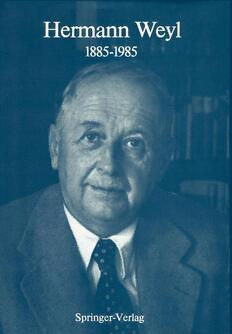
Hermann Weyl: 1885-1985: Centenary Lectures PDF
136 Pages·1986·26.753 MB·English
Most books are stored in the elastic cloud where traffic is expensive. For this reason, we have a limit on daily download.
Preview Hermann Weyl: 1885-1985: Centenary Lectures
Description:
Published for the Eidgenössische Technische Hochschule ZürichForewordThis volume marks the celebration of the Centenary of Hermann Weyl by the Swiss Federal Institute of Technology (ETH), Ziirich. That celebration was given a special substance and meaning by the three Centenary Lectures delivered here by Professor Chen Ning Yang, by Professor Roger Penrose, and by Professor Armand Borel. It is the purpose of this volume to make the text of those lectures available to a wider audience. The themes chosen represent only a fraction of Weyl’s mathematical interests. But they give us more than a glimpse of the mighty effulgence of his mind.Among all the mathematicians who began their research work in the twentieth century, Weyl was the one who made major contributions in the greatest number of different fields. He alone could stand comparison with the last great universalists of the nineteenth century, David Hilbert and Henri Poincaré. No one else bounds about among the peaks of mathematics with quite such dazzling aplomb.To Weyl the world ofideas and concepts was as real as the world of human beings. The force, the steadiness, the comprehensiveness, and the versatility of his intellect were matched by his generosity, sympathy, and support for striving young researchers spread around the globe.He was peerless in the part he played in the international world of mathematics and mathematicians, as adviser, inspirer, referee, bringer on, and godfather. And he was totally devoid of envy, rare even among the great.Incelebrating his Centenary, we are not just savouring the past, or savaging the present, but looking to the future with a sober idealism that transcends the personality. While inscribing a copy ofhis book on Classical Groups for one of his admirers, Weyl used a quotation from Gauss which said: ‘you have achieved nothing so long as there is something to be achieved’. There is much to be achieved. But the example of Weyl, as it flames and glows in our memory,will remain a source of inspiration for succeeding generations. The Centenary Lectures make this point in their own way.ETH Zurich, March 30, 1986 K. Chandrasekharan
See more
The list of books you might like
Most books are stored in the elastic cloud where traffic is expensive. For this reason, we have a limit on daily download.
